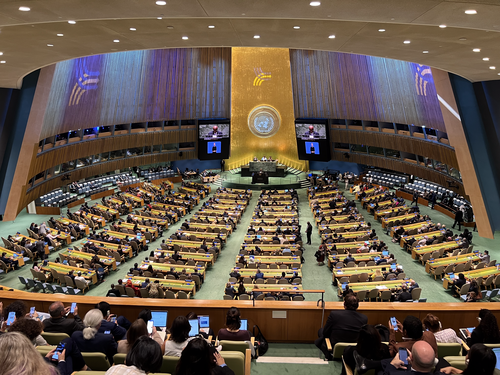UHC2030 hosted its annual UHC Day parliamentarian town hall to...
1 October 2024
A look at this year's UN General Assembly and highlights from the UHC movement

As Heads of State and governments and other stakeholders, including high-level representatives from international organizations, civil society and community organizations, non-governmental organizations and private sector entities, convened at the 79th UN General Assembly, there were several opportunities to keep health and universal health coverage (UHC) at the fore of the discussions.
Summit of the future, 20-23 September
On 22 September, world leaders adopted by consensus the Pact for the Future, which includes a Global Digital Compact and a Declaration on Future Generations. The Pact is the culmination of a years-long negotiation process and represents a strong statement re-iterating the commitment of Member States to the United Nations, the international systems and international law.
The Pact covers a broad range of issues including peace and security, sustainable development, climate change, digital cooperation, human rights, gender, youth and future generations, and the transformation of global governance. Health, including physical and mental health, is recognized in several clauses of the pact, with universal health coverage being integrated as fundamental for addressing poverty, inequality and environmental changes, and for promoting the rights of women and girls, education, social and economic development and sport. Universal health coverage is also featured as a commitment within the Declaration on Future Generations.
One significant omission from the pact is that negotiations did not result in securing health as a separate and comprehensive action clause alongside the listed and important topics for the future of humanity. UHC2030 remains concerned that the omission of a comprehensive action clause on health will leave many behind and does not sufficiently align to the Sustainable Development Goal Agenda’ promise to deliver universal health coverage. Making sure that everyone has access to health services without financial hardship based on a primary health care approach is critical not just for the health and well-being of people today but also to provide the basis for future generations to be resilient and better prepared for tomorrow.
UN high-level meeting on antimicrobial resistance
On September 26, the UN High-Level Meeting on Antimicrobial Resistance (AMR) brought global attention to the urgent threat posed by drug-resistant infections. World leaders adopted a political declaration aimed at accelerating action to combat AMR, emphasizing the importance of One Health approaches that integrate human, animal, and environmental health. UHC2030 welcomes the acknowledgement of the crucial role of universal health coverage in tackling AMR, which helps to prevent the mis- and overuse of antimicrobials by ensuring equitable access to quality, safe, effective affordable and essential health services, medicines, vaccines, diagnostics and health technologies. The meeting marked a critical step towards global collaboration in addressing this growing public health crisis and it is now time for governments to implement action on their commitments.
Side events co-hosted by UHC2030
UHC2030 also worked alongside other partners to mobilize greater political support for financial protection and alignment of external funding with national priorities during two side-events.
The 5th Annual Ministerial Meeting of the Group of Friends of Universal Health Coverage and Global Health: Financial Protection: the key to unlocking universal health coverage and ensuring equitable access for all
At the 5th Annual Ministerial Meeting of the Group of Friends of Universal Health Coverage (UHC) and Global Health, held on September 24 in New York, global health champions gathered to discuss the critical role of financial protection in achieving universal health coverage and equitable access for all.
Co-hosted by Georgia, Japan and Thailand, and supported by WHO and UHC2030, the event highlighted the urgent need for sustainable financing to reduce out-of-pocket health costs. Highlights included remarks by Mr Maris Sangiampongsa, Minister of Foreign Affairs of Thailand; Dr Takemi Keizo, Minister of Health, Labour and Welfare of Japan; Mr Darsalia Lasha, First Deputy Minister of Foreign Affairs of Georgia; Dr Jo Etienne Abela Minister for Health and Active Ageing of Malta, and Dr Jane Ruth Aceng, Minister of Health of the Republic of Uganda and other ministerial-level participants, who shared national and regional perspectives. The event emphasized participants’ joint determination to address financial barriers that keep people from accessing health services and to achieve health for all.
Taking the Lusaka Agenda forward: Optimizing partnerships to achieve universal health coverage
Building resilient and equitable health systems to accelerate progress towards UHC requires governments and their international partners to align with one national plan and work within national structures. To galvanize further support for the Luska Agenda principles, the governments of Canada, Japan, Mozambique and Nigeria, along with UHC2030 and the UN Foundation, hosted a side event on 26 September which brought together close to 30 speakers, including seven at the ministerial level.
The round-table discussion allowed for open and frank exchange on concrete steps to drive this agenda forward, including in areas of joint work and oversight, cross-board collaboration, and country implementation. The objective of the discussion was to take stock of the uptake of the Lusaka Agenda principles in contributing to the evolution of the global health financing eco-system and accelerate action toward domestically-financed health systems in achieving universal health coverage. The event also provided an opportunity for a range of stakeholders to demonstrate their own commitments to the Lusaka Agenda.
More UHC2030 News
A global health financing emergency threatens progress toward...
UHC2030 at HSR2024: Advancing equity and inclusion in health systems through civil society knowledge
UHC2030, in collaboration with the SUPPORT-SYSTEMS research...
